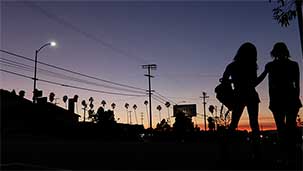In an interview for the 1991 documentary Hearts of Darkness (which I can’t recommend enough) Francis Ford Coppola describes the future of film making in this short sentence:
“One day, some little fat girl in Ohio is going to be the new Mozart and make a beautiful film.”
Tangerine is that film. Which means, I guess, you’re the chubby new Mozart from Ohio.*
Shot guerilla style on modified iPhone 5’s, Tangerine is a ludicrously exciting film, and a perfect example of how you can do something really interesting if you know how to compose a frame and tell a story. That the performances are uneven, or that the production values are utterly low rent, doesn’t detract from what is, in its finished state, a remarkable movie. Those things that might seem to be shortcomings in larger budget films actually help to create, in a film like Tangerine, a world that is both neo-realist and still somehow dreamlike.
The story is simple. It follows one person (a weirdly engaging and still amateurish performance from the oh-so-aptly named Kitana Kiki Rodriguez) in her search for a wayward boyfriend. Along the way a whole collection of outré characters pop in and out of frame, but it’s how the story is told—a great soundtrack, imaginative and constantly invigorating camerawork, and a verite that comes from something so intimate and small scale—that makes it special.
Coppola, in the same 35-second segment, also talks about how this new kind of filmmaker will liberate the art form from the artificial constraints of what he brackets as “professionalism”.
I think what he means is fairly simple: once filmmaking becomes a process that only requires a few willing participants, a couple of iPhones, a good computer, and some innate talent, then the artform is taken out of the hands of people who are only concerned with the economics of the film business. It changes the balance of power, which means that executive producers and distributors, financiers and beancounters move to their proper place in the hierarchy. Because, while these people are clearly an important part of the process, they are important only after the fact.
Too often—at least up till now—the only time an artist has had the wherewithal to make the work they really want to make is after they have emptied whatever pool of real talent they possess. People like Christopher Nolan and Tarantino only achieved that kind of autonomy after years of negotiating the studio system which seems (to me) to have sucked them dry of what made films like Reservoir Dogs or The Following so vital and alive (although apparently that has not happened to George Miller—so maybe proximity to Hollywood is also part of the equation). All these revered auteurs seem capable of creating now are these bloated, over-wrought productions, that are long on surface concerns like the Imax sequences in The Dark Knight Rises or Tarantino’s 70mm roadshow for The Hateful Eight and short on what was so promising in their early works: a real engagement with storytelling and character.
The whole film industry seems on the edge of catastrophic changes and Tangerine is one of the harbingers of that welcome disaster. It’s an example—for anyone with the foresight to see—of what it’s possible to do with nothing more than a couple of jacked up iPhones and a good idea.
And, of course, prodigious talent as well.
Sincerely,

Tim
*Skinny dude from New York actually, but even the Oracle of Delphi got the details wrong, now and again.







